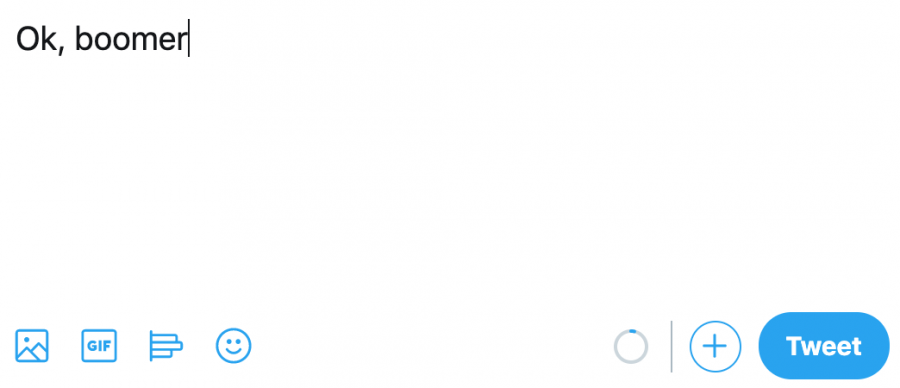Beyond the meme: “Ok, Boomer”
Highlighting the constant undermining of our generation by Baby Boomers and the harmful consequences
November 19, 2019
The millennials, Gen Z and the Boomers are at it again.
Amidst the TikToks and facebook status updates, this age old feud has materialized to the term “Ok, Boomer,” popularized by Peter Kulli and Jonathan Williams in their song of the same title. And since, thousands of memes have flooded Instagram, Twitter and TikTok. It has even entered the political arena, with 25-year-old New Zealand lawmaker, Chlöe Swarbrick, using the phrase in response to an older parliament member’s comments about her speech supporting her bill on climate change.
But this isn’t a term to be read into, right? Many of us casually throw it around, choosing to treat insulting comments made by Boomers with an air of nonchalance rather than engaging and further provoking them. However, some workplaces are now banning the term in workplaces, citing that it goes against “The Age Discrimination in Employment Act of 1967.” In a now deleted tweet, radio host Bob Lonsberry claimed that the term “Boomer” is the n-word of ageism.
Boomer is an informal noun referring to a person born during a baby boom, especially one born in the U.S. between 1946 and 1965.
The n-word is one of the most offensive words in the English language. https://t.co/30OAf7N83e
— Dictionary.com (@Dictionarycom) November 4, 2019
While we do make fun of the Boomers and their backward morals, it’s still important to note that they criticize us ad much as we joke about them. A traditionalist mentality seems to surround their “jokes” as they attempt to fit many of us into their moulds of what a young adult should look like. They’ve grown up with a certain perspective in mind, influenced by the events of their generation, but the problem arises when they start to question and insult cultural factors that characterize our generation.
Us joking about their dislike for ripped jeans is not the same as the blatant homophobic, racist, transphobic, sexist remarks that plague the Boomers’ retorts towards us. They label us as entitled, disrespectful brats and it seems like we have to accept these traits to prove that we’re deserving of all the conveniences, like technology and access to higher education, that many of us are born into.
boomers be like “tattoos? ha. unemployable! now let me get back to tolerating workplace sexual harassment because that is normal and fine.”
— ditch pony (@molly7anne) August 23, 2019
A study conducted by John Protzo, a psychologist from the University of California, Santa Barbara, concluded that even adult experts, specifically developmental psychologists, believe that later generations are getting worse over time in terms of attitude and intelligence. If professionals themselves claim that this is true, what is to make of our generation?
In Chinese language and culture, the term “strawberry generation” (used to express how many teenagers and young adults don’t have to work as hard or withstand social pressures like previous generations) seems to haunt us through our academic achievements and relationships. This predetermined notion of the inferiority of our generation severely underestimates our voices and opinions, and effectively silences us when we do rise up.
We are told that we have it better and easier than any other generation because of rapid technological advancements, but research proves otherwise. In reality, we may be the first generation that lives a lower quality of life than previous generations. Joshua Citarella, a researcher who studies online communities, told the New York Times that the reason for this is due to issues like a lack of access to affordable health insurance, essential items being priced higher than before and the price of rent increasing.
We are labelled as overly sensitive and “not able to take a joke”. We are seen as snowflakes and strawberries for bruising easily and not having the gritty mentality of generations past. How are we supposed to laugh at jokes about our sexual orientations, gender, class, mental health, state of living and current political climate when they are our reality and topics that shouldn’t be joked about in the first place?
The worst part is that not only do their words affect us, but so do their choicesー and we have to clean up after them and their mistakes. We have to protest against the dying polar bears and melting icebergs because these aren’t issues that are going to affect their future. Our country is so divided right now that everyone is yelling into their own echo chambers. The Boomers constantly defend the second amendment, selfishly refusing to regulate gun control, instilling a lingering fear in many of us whenever we go to school, or any public space.
Sounds a lot like the home economics curriculum cut from budgets when boomers decided standardized test scores were priority https://t.co/FSFcqchhg7
— Angela Davis (@TheKitchenista) January 17, 2019
In an interview with Vox, author Bruce Gibney talks about how Boomers were brought up in post-war, post-depression America, were handed a rich, dynamic country but still managed to spoil the social fabric on the country. He says that the rise of middle-class, white Boomers in the government and social scene led to multiple selfish decisions that left future generations with a “financial disaster.”
The Boomers may think that we would rather seek childish desires rather than want a white picket house with two kids and a dog. They may think that tattoos and colorful hair won’t get us a stable job. They may think that we are silly for protesting monthly on matters like climate change and gun violence. But we’ve endlessly proven that we’re not going away: Greta Thunberg, Ahed Tamimi and the Parkland shooting victims are just a few examples.
But we’re here to stay and make changes.


















